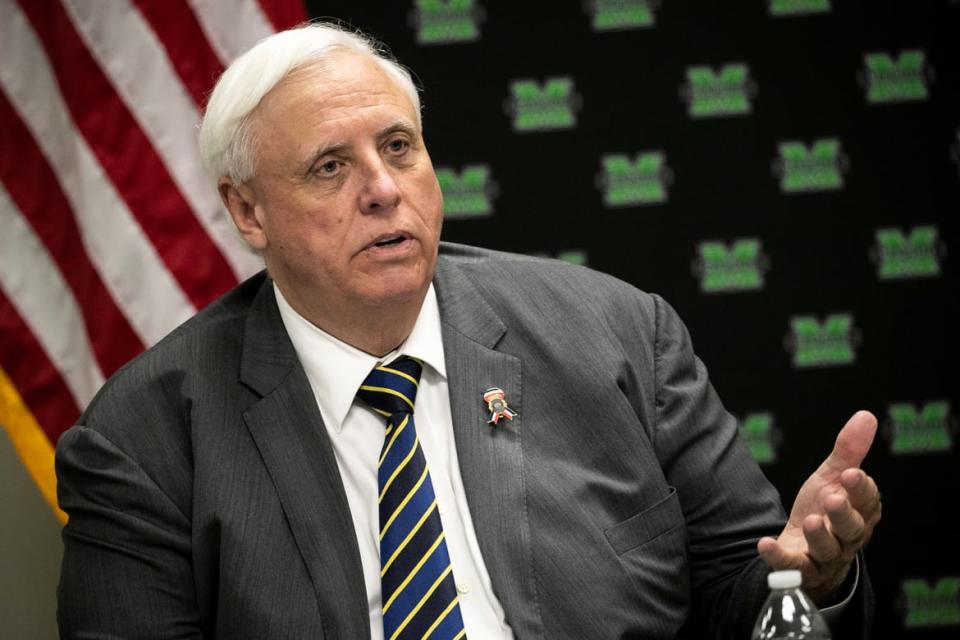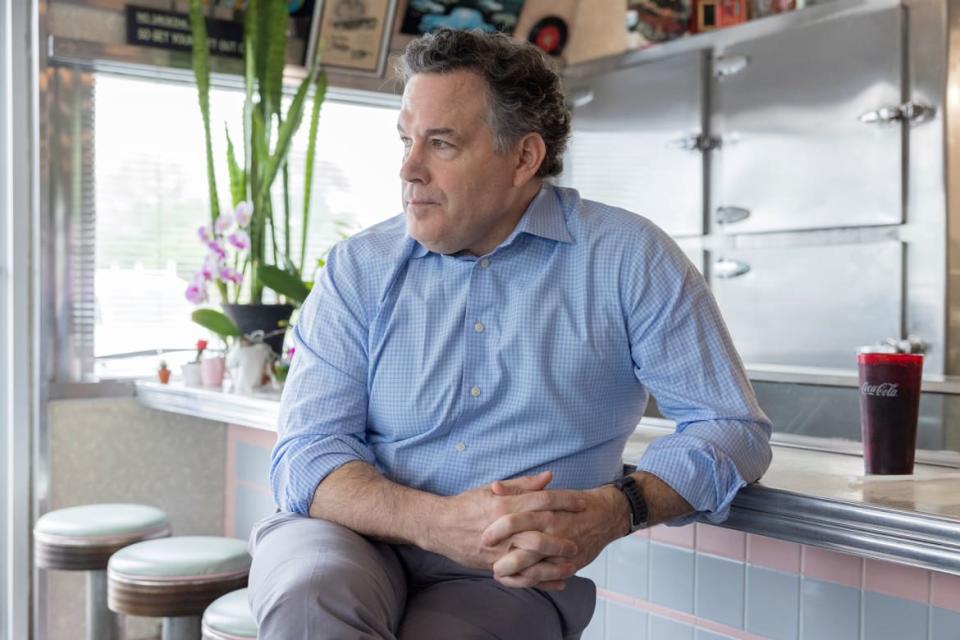The Senate GOP Has a 2024 Candidate Strategy. Will Sunshine Laws Ruin It?

- Oops!Something went wrong.Please try again later.
Pay Dirt is a weekly foray into the pigpen of political funding. Subscribe here to get it in your inbox every Thursday.
The Senate GOP’s campaign arm seems to have stumbled upon a novel strategy this cycle: recruit rich candidates who will pour their fortunes into their own campaigns.
But there’s one wrinkle to that gambit—and it may dampen Republican hopes to enlist the ultra-wealthy, self-funding candidates they want: financial disclosure laws.
Every candidate for federal office—as well as the officeholders themselves—are required to submit their finances to the public’s microscope by filing personal financial disclosures (PFDs) to congressional authorities.
For Senate candidates, they must file a thorough accounting of their finances within 30 days of becoming a candidate, and that accounting requires much more detail than the disclosures most states mandate for their candidates.
How Herschel Walker’s Wife Tried—and Failed—to Profit Off His Campaign
For instance, the federal disclosure forms ask candidates to disclose any earned income above $200, any assets worth more than $1,000, liabilities costing over $10,000, any position they’ve held—paid or not—within the last two years, all agreements about future employment arrangements (like book deals), and all compensation over $5,000 for the last two years.
And if these candidates did win, they’d just be subject to even more disclosures, like reporting any stock or security transaction over $1,000, gifts over $415, and travel reimbursements over that same threshold.
Politico recently reported that “at least 10 candidates with sizable net worth are seriously considering self-funded Senate campaigns in more than a half-dozen swing states—many of them at the behest of the National Republican Senatorial Committee.”
In Montana, Wisconsin, Pennsylvania, and West Virginia, the GOP has already lined up several formidable cash cows going into 2024. The crop of potential self-funding candidates includes Montana’s Tim Sheehy, a former Navy SEAL and CEO of Bridger Aerospace; West Virginia Gov. and coal industry titan Jim Justice; Wisconsin real estate magnate Eric Hovde; and hedge funder Dave McCormick of Pennsylvania, who came just 951 votes shy of Mehmet Oz in the Keystone State’s 2022 GOP Senate primary.
For most people, these requirements aren’t too onerous. They may have a couple bank accounts, a 401K, maybe even a few stocks or a rental property. But for the ultra-wealthy individuals that the Senate GOP is trying to recruit, things are much more complicated.
Just look at some of the PFDs of the wealthiest individuals already in Congress, like Rep. Michael McCaul (R-TX). McCaul married Linda Mays, the daughter of Clear Channel Communications founder Lowry Mays. Because spousal assets must also be disclosed, McCaul’s PFD is typically 60 or 70 pages long, with more than 50 assets listed on each page.
Want More Trust in Congress? Ban Them From Stock Trading.
For some ultra-rich Senate hopefuls, their first PFD would offer the clearest-ever glimpse of their complicated finances. That could get uncomfortable fast.
Justice, for instance, is set to launch his campaign against Sen. Joe Manchin (D-WV) on Thursday. Once considered a billionaire, Justice—whose sprawling business portfolio includes coal, agriculture, and hospitality—reportedly owes an array of “substantial debts,” some stemming from lawsuits. A West Virginia bank even went after him last month to garnish his wages as governor over an unpaid $850,000 loan.

Jim Justice II, Governor of West Virginia in Huntington, W.V., on July 8, 2019.
It’s possible some candidates might glance at the stiff requirements—and recent political history—and find reason to opt out of running altogether. Former Sen. Kelly Loeffler (R-GA), a multi-millionaire many times over, saw her fortune picked apart during the course of a brutal 2020 campaign. The same could be said of her fellow former Republican Georgia senator, David Perdue. Or even the last aspiring Georgia GOP Senate candidate: Herschel Walker.
But the point is, these candidates’ finances could be revealed as extraordinarily messy—and fuel a number of unflattering stories.
In Montana, Sheehy has defended the “Environmental, Social and Governance” concept—a criteria that some investors use to decide where to put their money. But Republicans writ large have made a sport out of going after “ESG” as a symptom of an overly woke corporate America. Sheehy may find it difficult to explain away his position, as well as the $160 million in ESG bonds his company took last year.
Some self-funding candidates have already learned firsthand the price of running for office. In the case of Hovde, the real estate tycoon who might run against Sen. Tammy Baldwin (D-WI), he faced an onslaught of criticism six years ago when he last tried to take down Baldwin because he didn’t pay state income taxes in some years where he had big tax write-offs.
“Some years you pay an ungodly amount and some years don’t pay as much because you have a big depreciation," Hovde told The Milwaukee Journal Sentinel in 2017, after estimating a few years before that he was worth more than $100 million.
Last year in Pennsylvania, McCormick avoided a lot of criticism because his leading GOP primary opponent was Oz, a TV doctor so wealthy he couldn’t even remember how many houses he had. (The answer, according to his financial disclosure and other public documents, was 10.)

Dave McCormick, Republican Senate candidate for Pennsylvania, campaigns at a diner in Oxford, Pennsylvania on May 14, 2022.
But even still, the Associated Press was keen to point out that, for all of McCormick’s “hometown boy-done-good” schtick, he was also the CEO of the world’s largest hedge fund.
While there are clear pitfalls for these self-funding candidates, it’s not hard to understand why Republicans—and Democrats—would still love to recruit challengers who can pour their own money into their races. In 2022, Democratic Senate candidates outraised Republicans by nearly $300 million. Finding politicians who can eat into that advantage without taking money away from other races could be crucial for Republicans trying to take back the Senate chamber.
Still, as Bloomberg noted, of the eight congressional candidates who loaned their campaigns more than $10 million in 2022, only Rep. David Trone (D-MD) won.
Paul S. Ryan, vice president of litigation at the good government group Common Cause, wasn’t very sympathetic to potential candidates who had reservations about making their finances public.
“As I sometimes say to my 8-year-old, ‘If you don’t want to be embarrassed, don’t do things that would embarrass yourself,’” Ryan said.
“To the extent that a candidate would be embarrassed by their own financial disclosures, that speaks more to their own money management than it is an indictment of these disclosure requirements,” he said.
Ryan was clear that these disclosures were more akin to the bare minimum for public office, though he did say they were also “critically important.”
“Serving in Congress is a position of public trust, and it requires a little bit of sacrifice for those who seek that trust,” he said.
Nora Keefe, a spokesperson for the Democratic Senatorial Campaign Committee, said in a statement that “Republicans want to stack the Senate with ‘filthy rich’ candidates who will look out for themselves and their friends in mega-corporations. As their financial entanglements face a new level of scrutiny, we expect they’ll have many questions to answer.”
The NRSC did not return a request for comment.
But the true irony of these financial disclosures is that, as much light as they can shed on a person’s finances, they’re also poorly designed for the mega-rich.
How to Pay Off a Porn Star (If You Really Must)
In 2016, HuffPost rated the Trump campaign’s declaration that financial disclosure requirements are “not designed for a man of Mr. Trump's massive wealth” as the truest thing his campaign had said during the entire election.
The reporting ranges for assets increase exponentially on the PFDs, so an asset worth between $1,000 and $15,000 would have a relatively specific value. But as assets increase in worth, the reporting ranges get much wider, going from $1 million to $5 million, $5 million to $25 million, $25 million to $50 million, and then just an infinite category of anything more than $50 million.
So while these ultra-rich, self-funding political hopefuls may wince at the public getting a look at specifically what companies and stocks they own—or who they owe money to—the public still wouldn’t be able to say exactly how much any of these people are worth.
That’s the beauty of a disclosure system for the riches of politicians that was designed by rich politicians.
Get the Daily Beast's biggest scoops and scandals delivered right to your inbox. Sign up now.
Stay informed and gain unlimited access to the Daily Beast's unmatched reporting. Subscribe now.

